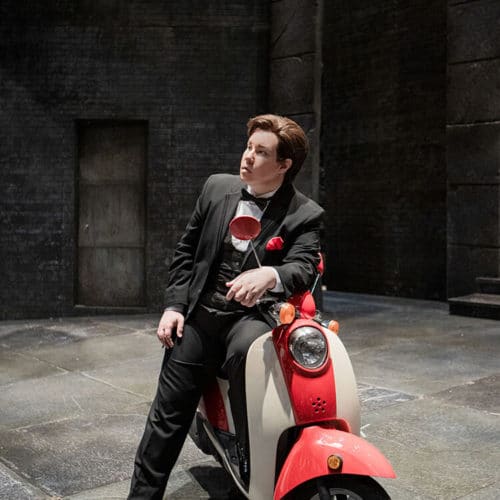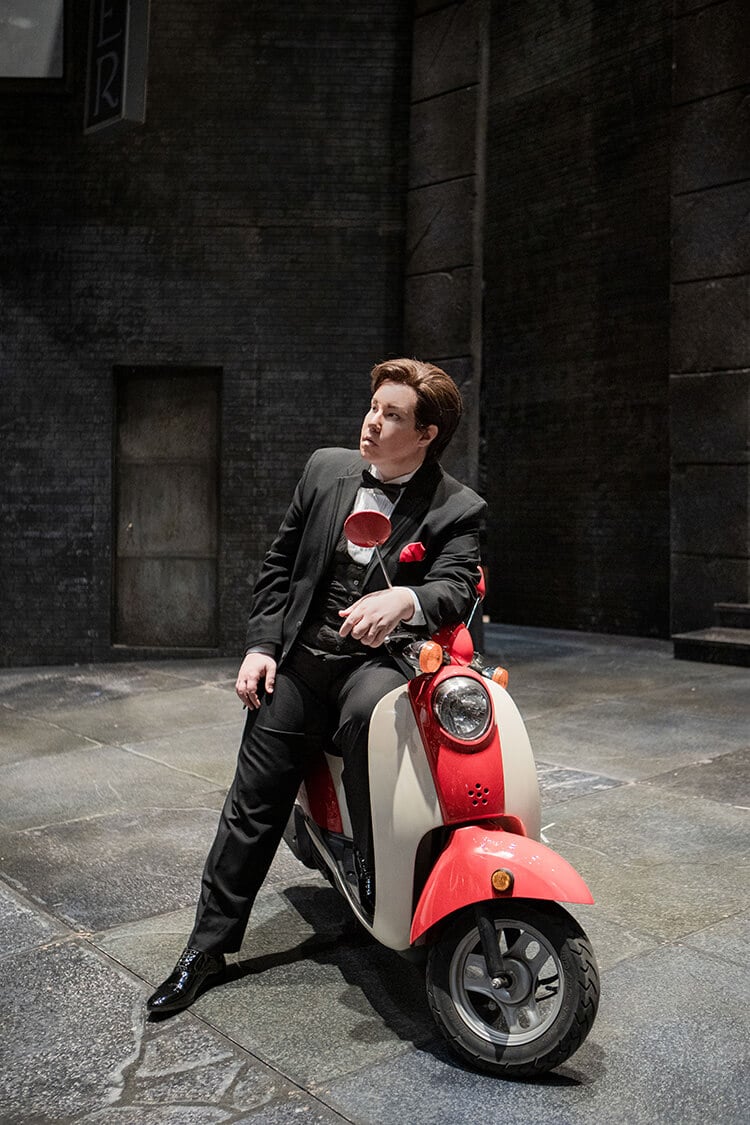The trans Don Giovanni: first review
mainAfter all the previews, no major media descended on Tulsa, Oklahoma, to review Lucia Lucas, a transgender baritone, sing the first Don Giovanni of her kind, curated by the composer Tobias Picker.
For the time being, there is just the one rave review in Tulsa World. It is not readable outside the US, due to EU restrictions.
In the title role, Lucia Lucas is nothing short of a revelation. She possesses a voice that can rattle the rafters with its power, without ever sacrificing subtlety of expression. It is a voice filled with character in every sense of the word, as flexible in expression as Lucas is in taking on
the myriad personae Don Giovanni adopts as he goes about his lecherous business.

photo: Tulsa Opera
UPDATE: From MusicalAmerica’s review by Clive Paget:
Oklahoma–If ever proof was needed that opera can still surprise, provoke and even have something to say, the Act One Finale of Opera Tulsa’s Don Giovanni is it. Updated to America (ish) and sometime in the 1950s (ish)—neither are entirely clear, or indeed that relevant—this Don is all of a sudden revealed as the life and soul of his own party, strutting his considerable stuff in full drag—or is he? For a moment, our gender compass goes haywire, for this production stars the impressive trans baritone Lucia Lucas. What we are watching is a woman who has been playing a man, now playing a man who is dressed as a woman—and loving it. Confusing? For a second, perhaps. But’s a glorious moment in Denni Sayers’s occasionally uneven production that received its premiere by the 71-year-old Tulsa Opera at Tulsa Performing Arts Center on May 3.






in Switzerland I can read it
Switzerland ain’t part of the EU or the EEA.
Soon the Brits will also have access to restricted American sites.
Tulsa is a small opera company. The city of Tulsa is delightful; but even this would not be enough to attract opera critics on a very tight budget.
Curious that the review doesn’t mention that Lucas is a transgender. You’d think it would be newsworthy enough to at least merit a sentence for readers who aren’t up to speed on this.
This review, which is indeed a rave, might be considered gushing were it not so articulate and intelligent — the writer is clearly expressing his view.
His expectation that the Tulsa audience would immediately catch allusions to La Dolce Vita suggests he thinks that the opera-goers at that venue are a well-informed and sophisticated lot.
Lucia Lucas appears to be very well-known. (Not to me, granted, but there are lots of people I have never heard of). To make an issue of her sexual situation would surely be rather like, if an actor such as Rupert Everett or Stephen Fry appeared in a film as a married man, reminding audiences that they are gay.
” a transgender baritone,”
Does that mean a woman who wants to be a man, or a man who wants to be a woman?
From the singer’s own website:
Lucia Lucas spent so long trying to play a boy/man in real life, she is adept at playing men and is always happy to play a man onstage (so long as she doesn’t have to play one in real life). She welcomes the majority of her work to be masculine presenting and her personal life to remain personal.
That is as goodly a succession of non-sequiturs as I have seen on these pages.
In opera, gender is a fluid concept. For instance, in Rosenkavalier, Octavian is a young man sung by a female soprano, but Octavian dresses-up as a chamber maid in act one and imitates a girly voice. Nobody gets confused, including the singers themselves, which is quite an achievement.
She is a woman. Period. Her voice type is baritone.
Musical America, top story
“Tulsa’s Trans Don Delivers, and How”
This whole transgender thing is confusing. If Lucia Lucas wants to dress as a woman and live as such, why doesn’t he sing soprano or mezzo roles?
If his private life is so private, why does he constantly refer to himself as a transgender woman?
At the end of the day, his DNA is still male…..
Just sayin’……
The reason that she doesn’t sing soprano roles is the same reason that violins don’t play contrabass parts.
You mean “he”.
I meant she. It’s not in my nature to litigate people’s preferred pronouns, ethnic identity, and so on, Mr. Pekkiaos. Got that right, I hope.
“This whole transgender thing is confusing.” That is the entire intention of the project. To screw your rmind up so that you spend more money on psychiatrists’ consultations and tranquilizers.
I’m sorry, but this is a bit of a sore spot for me. You are being very disrespectful to refer to Ms. Lucas as “he” unless you are referring to her in the role itself. “Don Giovanni encounters Masetto and Zerlina; he immediately tries to seduce the latter” would be correct, but “As Don Giovanni, Ms. Lucas deploys her strong baritone voice; she uses a wide dynamic range.” Yes, it’s confusing at first, but it’s not too far to go to give somebody the dignity and respect that they deserve.
As far as why Ms. Lucas has decided to keep her natural baritone voice and not sing in falsetto, you would have to ask them. I’m a baritone and I could probably retrain as a countertenor if I wanted to, but I choose to remain a baritone. She can make the same choice if she wants to, and the choice is entirely hers to make.
Very intelligent and respectful answer to ignorance masquerading as opinion.
Don Giovanni invites for messing with gender roles. In the Netherlands, a small boutique opera company once had a production where ALL gender roles were reversed, ‘Donna Giovanna’, and where the don (depicted as a woman and sung by a female singer) was chasing men (the female roles transformed into male ones and sung by male singers). The singing parts were simply transposed an octave upwards or downwards and it worked excellently in terms of music. The result of the production was, of course, a strong warning against a too feminist approach to philandering.